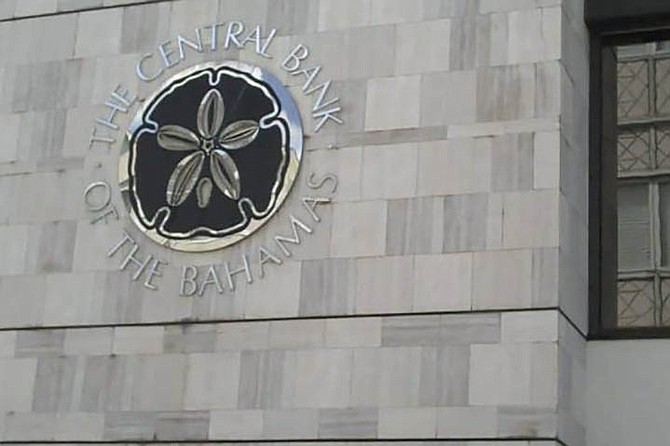By NEIL HARTNELL
Tribune Business Editor
nhartnell@tribunemedia.net
The Central Bank yesterday forecast that The Bahamas will "resume healthy economic growth" in 2021 following a potential Dorian-induced contraction next year as rebuilding gathers pace.
The banking and monetary policy regulator, unveiling a much-changed outlook for The Bahamas, suggested that this nation's gross domestic product (GDP) would still expand in 2019 - albeit a much lower pace than the projected 1.8 percent - as winter season tourism gains had already been locked-in prior to the category five storm's arrival.
With its analysis suggesting Dorian's impact will likely be a short-term blip if any further hurricanes are avoided, the Central Bank said expectations of an earlier return for Grand Bahama's economy underpinned its 2021 assessment - especially given the "lengthier absence of commerce" on Abaco and the surrounding cays. However, tourism's recovery may go beyond 2020.
Abaco's loss will be felt most dearly in the vacation rental market, as the island accounted for 17.5 percent - or almost one in five - listed bookings during the eight months to end-August 2019. Together with Grand Bahama, the two islands have received more than one-quarter or 25.6 percent of all bookings in that market segment prior to Dorian's arrival.
As for the fiscal side, the two islands generate almost 13 percent of the government's value-added tax (VAT) take. Based on revenue projections of $1.1bn in VAT for 2019-2020, it seems likely that Dorian may have blown a $143m hole in the government's estimate there.
Both Abaco and Grand Bahama account for a combined 10.7 percent of customs duty collections. Given that taxes on international trade and transactions are projected at $489m for 2019-2020, and excise tax at $283m, it appears that a further $82.5m combined may be lost here, meaning the deputy prime minister's $200m revenue loss assessment is not far off.
"The domestic economy will experience a negative, short-term fallout from Hurricane Dorian," the Central Bank projected. "Prospects remain for a positive growth in 2019, but considerably less than the original forecast which predated the storm.
"This is largely due to the timing of the storm, at the onset of the slowest months in the tourism season, whereas the robust gains from the first half of 2019 have already been realised. The performance could be flat, to slightly contracted for 2020, before a healthy growth trajectory resumes in 2021.
"Underlying this would be an expected steady, earlier return of operation in the core of Grand Bahama's economy, in contrast to a lengthier absence of commerce, other than rebuilding activities, in Abaco."
Analysing the fall-out for tourism, the Central Bank added: "In the stopover market where recovery could extend beyond 2020, Abaco accounted for 7.9 percent of the air arrivals recorded in the first seven months of 2019.
"In the vacation rental market in the eight months to August 2019, Abaco further housed an estimated 17.5 percent of booked listings in The Bahamas, compared to 29.4 percent for New Providence and 13.3 percent for Exuma.
"In the meantime, Grand Bahama's recent share of air visitor arrivals was 3.8 percent, and the Island received an estimated 8.1 percent of vacation rental bookings in the first eight months of 2019.
"As to the fiscal exposure, an estimated 7.8 percent of recent VAT revenue payments originate from Grand Bahama and 5 percent from Abaco. The islands, Grand Bahama and Abaco, account respectively for 7.1 percent and 3.6 percent of recent customs duty collections."
The Central Bank added that the rebuilding of Abaco and Grand Bahama will attract multi-million dollar private investment and reinsurance payment inflows. "This should result in elevated demand for, and employment of, construction-related skills, which should partly offset reduced payrolls in the remaining sectors," it said.
"Two factors that could mitigate the depth and duration of the economic slowdown are the size of the available pool of construction labour to expedite the rebuilding process, and the degree of substitutability of tourism capacity elsewhere in The Bahamas for the facilities taken offline in Abaco and Grand Bahama.
"Available construction skills speak to the speed at which the housing and commercial plant will be returned to use. In the meantime, underused tourism capacity in New Providence and other Family Islands could provide some offsetting relief to displaced visitor demand," the Central Bank continued.
"For vacation rentals, in particular, the current average occupancy rates approaching 50 percent provides space for near-term business expansion without required growth in the physical plant, providing the marketing and other support infrastructure are aligned."
While the Government's short to medium-term fiscal position faced a double whammy from revenue losses, due to tax concessions and reduced economic activity in the two affected islands, and increased spending to restore public infrastructure, the Central Bank said global assistance and credit facilities will reduce some of the financial pressures on government.
"With regard to external reserves, developments will largely depend on one-off reinsurance inflows, as well as the net effects of the seasonal increase in foreign currency demand and a rise in imports for rebuilding activities," the Central Bank said.
"As to timing, it is projected that the reserves will close out 2019 higher than in the absence of the storm as reinsurance proceeds accumulate, with a net drawdown only evident in 2020. Nevertheless, external balances indicators are anticipated to remain above international targets."





Comments
Use the comment form below to begin a discussion about this content.
Sign in to comment
OpenID